Appearance before the Senate Standing Committee on Aboriginal Peoples on S-3 - An Act to amend the Indian Act in response to the Superior Court of Quebec decision in Descheneaux c. Canada (Procureur général), May 16, 2022
Table of contents
- Overview
- S-3 Update
- Overview and Implementation of S-3
- Impacts on programs and services
- Status of removal of 1951 Cut-Off
- Addressing remaining inequities in the Indian Act
- Policy and Process Changes in response to S-3
- Transfer of responsibility to First Nations
- Investments on engagement, outreach
- Nicholas Case and Addressing Enfranchisement
- Next steps (more outreach, improving wait times)
- Additional Background
- Biographies
Overview
Scenario Note
Logistics
Date: Monday, May 16, 2022
Time: 2:00 p.m. - 2:30 p.m. EDT: S-3 ISC
2:30 p.m. - 3:00 p.m.: C-19, BIA 2022 No. 1 Finance Officials
3:00 p.m. - 4:00 p.m.: MMIWG, CIRNAC Minister/Officials
Location: Room C128, Senate of Canada Building and by videoconference
Subject: Implementation of An act to amend the Indian Act in response to the Supreme Court of Quebec's decision in Descheneaux c. Canada (Procureur général)
Witnesses
- Christiane Fox, Deputy Minister, Indigenous Services Canada
- Paula Hadden-Jokiel, Assistant Deputy Minister, Regional Operations, Indigenous Services Canada
- Michael Walsh, Senior Director, Registration and Integrated Program Management
Context
APPA has been studying the constitutional, treaty, political and legal responsibilities to First Nations, Inuit and Métis peoples. As part of this broad study, the committee has been examining Reclaiming Power and Place: The Final Report of the National Inquiry into Missing and Murdered Indigenous Women and Girls. Minister Miller will appear on May 16 on the MMIWG study.
APPA has also held two meetings to examine An act to amend the Indian Act in response to the Supreme Court of Quebec's decision in Descheneaux c. Canada (Procureur général) — previously known as Bill S-3.
On March 28, 2022, the committee heard from the Ontario and Canadian Native Women's Association, the Canadian Feminist Alliance for International Action, Ryerson University and former Senator Lillian Eva Dyck. Witnesses testified that it's taking too long for Indigenous women to receive registration and the Government of Canada should hire and train more people to speed up the registration process. Some said the bill did not remove all sex-based discrimination.
The APPA members expressed concerns with the implementation of the Act, also expressing concerns with the length of time it takes for registration, the waiting list and red tape. Senator Arnot (ISG) inquired who should be responsible for designing and implementing communications material to ensure Indigenous women understand both the Act and how to register. The Senator also asked if there needs to be an effective accountability mechanism put in place to hold the Government to account.
On May 2, APPA heard from a lawyer, an individual (Jeremy Matson) and from a member of the Committee on the Elimination of Discrimination Against Women. Overall, witnesses said Canada's approach with its Indian registration and band membership provisions runs contrary to international obligations and Indigenous people do not have reasonable legal forum in Canada to address ongoing discrimination. One of the recommendations from the Committee on the Elimination of Discrimination Against Women was that Canada should amend its legislation to enshrine the fundamental criterion of self-identification and provide registration to all matrilineal decedents and to all patrilineal ascendants equally.
The Senators asked about the appeals process, how to improve the application process, how S-3 should be amended to address sex-based discrimination, whether UNDRIP may become a key guidepost in addressing the issue of asserting the right to self-determination, and whether the Indian Act should be abolished and replaced with a robust self-government model directed by First Nations, Inuit and Métis.
Meeting proceedings
Senate committees are generally less partisan than House of Commons Standing Committees, however, it should be noted that the Senators on this Committee tend to ask detailed questions, that often result in follow-up requests.
The Deputy Minister will be invited to make opening remarks of no more than five minutes. It should be noted that currently, APPA has not determined a sequence on the order of questioning based on political parties. The Chair decides who to call to ask questions during the meeting.
The Chair will usually say how long each member will have just before the start of the time for questions. They usually have about 5 minutes.
Opening Remarks
Speaking notes
Deputy Minister Christiane Fox
Indigenous Services Canada
Implementation of Bill S-3
An Act to amend the Indian Act, in response to the Superior Court of Quebec decision in Descheneaux c. Canada
Senate Chambers
May 16, 2022
Kwe Kwe, Tansi, Unnusakkut, Good morning, Bonjour.
I'm speaking to you from the Treaty 6 territory in Saskatchewan. Thank you for inviting me to speak before the committee today.
Mr. Chair, the Government of Canada is determined to redress historic wrongs and advance gender equality and reconciliation with Indigenous Peoples. We are committed to addressing the injustices and challenges that many First Nations face as it supports broad self-determination, self-governance and self-reliance for all interested First Nations.
We have taken an important step forward along that path with Bill S-3. The legislation responds to longstanding concerns about gender inequality and discrimination raised by First Nations people, the United Nations Humans Rights Committee, the National Inquiry into Missing and Murdered Indigenous Women and Girls, and other key stakeholders.
While much work remains, I will now report on our progress in implementing S-3 since our last update.
Indigenous Services Canada (ISC) has made significant headway in processing registration applications – in part due to now having dedicated units in Gatineau and Quebec City as well as increased staffing at the Winnipeg Processing Unit. The Department has invested $15.8 million in human resources, policy changes and modernization to accelerate our processing speeds to ensure timely registration of newly entitled individuals.
Last year, at this time, we had processed 17,500 S-3 applications. As of April 2022, the Department has more than doubled that number, handling over 37,000 applications.
We have processed or partially processed more than 85% of the applications received. To date, 28,152 individuals have been registered, providing them access to associated rights, benefits and services.
We gave priority to processing applications for older applicants newly entitled under S-3. All applications for individuals over the age of 75 have now been processed. We have completed 383 applications for those 65 years and older and are actively processing the remaining 61 files.
I am pleased to confirm that the Department anticipates it will be processing applications within its six-month service standard by September 2022. We expect to be fully within our service standard later this year.
Projections had suggested that between 270,000 and 450,000 individuals could be eligible to register under S-3. A Statistics Canada analysis published last October indicates the number of S-3 registrations may be lower than initial estimates and uptake could occur over a longer period.
To make sure people are aware of their potential eligibility for registration, ISC allocated $5.4 million to engagement, outreach and monitoring. The Department has developed a robust communications package with information on S-3 and registration – including questions and answers, videos and infographics – to distribute to communities, partners and organizations across Canada.
This information was shared through Indigenous Link, a partner organization connected to over 28,000 unique Indigenous organizations, businesses and other groups across the country.
As well, ISC funded the Assembly of First Nations and the Native Women's Association of Canada to hear from advocates on the implementation of S-3. We sought their perspectives on best practices to communicate the legislation among the impacted population.
Admittedly, there is still a lot more work to undo the damaging impacts of the Indian Act's registration and band membership provisions. So, we will need to continue to amend the Act until First Nations take full jurisdiction over citizenship.
Our Department is committed to co-developing solutions with First Nations partners to address the remaining inequities that deny First Nations peoples their inherent rights.
Proactively righting historic wrongs in cooperation with Indigenous Peoples will advance reconciliation and support a renewed relationship between Canada and First Nations -- one not marred by the paternalism and control of the Indian Act, but one based on rights, respect, cooperation and partnership.
Thank you.
S-3 Update
Overview and implementation of S-3
Issue summary
In 2016, Bill S-3 was introduced in response to the 2015 Descheneaux decision, which found that the registration provisions in section 6 of the Indian Act violated equality rights under the Canadian Charter of Rights and Freedoms (Charter).
As they were, the registration provisions perpetuated a difference in treatment concerning entitlement to registration between First Nations women as compared to First Nations men and their respective descendants.
S-3 came fully into force to redress sex-based inequities in the registration provisions. The implementation of S-3 has resulted in registration category amendments for over 125,000 registered individuals; extended the capacity to pass on eligibility to their descendants to over 57,000 individuals; and to date, has resulted in over 45,000 new S-3 specific applications received.
Key messages
- The implementation of S-3 responds to the Calls for Justice outlined in the Final Report of the National Inquiry into Missing and Murdered Indigenous Women and Girls and aligns with the Government's commitment to reconciliation.
- While S-3 addressed known sex-based inequities in the registration provisions of the Indian Act, their residual impacts persist and other inequities still require redress. Solutions to these issues are being considered in ongoing engagement with First Nations, experts and advocates.
Background
In July 2016, the Government of Canada introduced a staged approach in response to the Descheneaux decision that included legislative amendments to the registration provisions of the Indian Act in order to address sex-based inequities in registration.
In 2017, the first set of amendments came into force to address sex-based inequities in the registration provisions, including the differential treatment of siblings, cousins, and minor children omitted from the Register. At this time, a new provision was also introduced to support applicants with unknown or unstated parentage; the Indian Registrar is now required to review a range of evidence and draw every reasonable inference in favor of the applicant in determining entitlement to registration.
Between 2018 and 2019, the Collaborative Process on Indian Registration, Band Membership and First Nations Citizenship occurred across the country. Consultations were led by Crown-Indigenous Relations and Northern Affairs Canada, with Indigenous partners and more than 400 communities on how best to bring S-3 into force.
In August 2019, further amendments removed what is known as the "1951 cut-off." Now, descendants born prior to April 17, 1985, or born of a marriage before that date to Indian women who lost eligibility for registration or were removed from band lists due to marriage to non-Indian men dating back to 1869, are entitled to registration under the Indian Act.
This meant that known sex-based inequities in the section 6 registration provisions of the Indian Act had been addressed.
Bill S-3 required the responsible Minister to report to Parliament three times.
- On May 10, 2018, the First Report to Parliament was tabled and reviewed the co-design of the Collaborative Process.
- On June 12, 2019, the Second Report to Parliament was tabled and reviewed the status and findings of the Collaborative Process.
- On December 11, 2020, the Final Report to Parliament was tabled and reviewed the implementation of S-3.
Implementation Process
In response to S-3 fully coming into force and to assist in application assessment and processing capacity, the Department introduced policy solutions, technical efficiencies and hired and trained additional staff at the dedicated S-3 processing unit in Winnipeg. The Department stood up a new processing unit Quebec city to further support the processing of S-3 applications.
The Department continues to seek additional investments to improve processing capacity and client experience, such as the development of online tools.
As a result of S-3, some individuals registered under subsection 6(2) became eligible for a category amendment to 6(1) which allowed the transmission of status to their descendants. The Department proactively automated over 125,000 category amendments of individuals. Over 57,000 already registered individuals are now able to pass on entitlement to their descendants because of the change in legislation. The Department developed and distributed communications products through stakeholders, organizational partners, and provincial and territorial groups to highlight how the implementation of S-3 has resulted in more individuals becoming eligible for registration, as well as more individuals receiving an amendment to their entitlement category. Through ongoing engagement, the Department will continue to share more information and encourage the public to seek status verification.
Due to the paper-based, mail-in nature of applications for registration, productivity early in the pandemic was reduced. Processing has now exceeded pre-COVID rates.
Current status
The service standard for the processing of applications for registration remains 6 months but in 10% of cases can take longer, for example, when genealogical research is required to link the applicant to an entitled ancestor. That said, some applications are processed very quickly at regional offices, for example, when the child of two parents is already registered. As of April 4, 2022, 45,663 applications have been received under S-3: 28,152 newly entitled applicants have been registered, and 6504 applications remain in the inventory. This is in addition to the processing of regular registration applications.
The Department continues to invest in, strategize, and activate a robust plan to ensure that S-3 is better understood by the public. We continue to strategize and seek new modes of outreach.
The Department continues broad outreach with First Nations and Indigenous partners on S-3 in order to encourage individuals to apply. New public communications materials were created to explain how S-3 impacts individuals and affects registration. A robust communications package with information on S-3, registration, FAQs, and other materials to distribute to communities, partners, and organizations across Canada were developed to draw awareness to S-3. This information was shared through Indigenous Link, a partner organization, connected to over 28,000 unique Indigenous organizations, businesses, and other groups across Canada. In order to strategically reach an even broader range of the newly eligible population, the Department: shared information through Women and Gender Equality Canada; shared information with child and family service organizations at the provincial level; and distributed our communications package to over 1000 women's and seniors' organizations across Canada.
The Department's outreach to urban communities and urban Indigenous organizations has sought to build awareness among and provide support to individuals newly entitled to registration under S-3.To support the transfer of services, over the last year, the Department has increased its number of trusted source partnerships from 3 to 12 with more on the way. These partners have been delegated by the department as a reliable source of information and assist clients through status card processing and providing information on registration including S-3.
The Department is working collaboratively with First Nations partners on outreach and awareness activities to reach individuals who may be eligible for registration. These partners include the Assembly of First Nations, the Native Women's Association of Canada, and the Feminist Alliance for International Action. The Department also continues to meet bilaterally and multilaterally with First Nations on outreach and awareness sessions relating to S-3.
While S-3 addressed sex-based inequities, a number of outstanding inequities in the registration and band membership provisions remain and require redress. Building on the momentum of S-3, the Department is working to address these remaining issues. By proactively righting historic wrongs and working in cooperation with Indigenous peoples, we will continue to advance reconciliation and support a renewed relationship between Canada and Indigenous peoples.
Impacts on programs and services
Issue summary
At the four-year mark, the Department has seen one half of the S-3 applications it had initially anticipated and the number of newly registered individuals is also lower than expected. As a result, the impacts to date to programs and services associated with registration under the Indian Act are minimal.
The implementation of S-3 to-date has not yielded funding pressures on programs linked to Indian status. The Department continues to engage with provinces, territories, and First Nation communities to monitor any impacts associated with S-3, and is committed to ongoing outreach and timely access to programs and services for those newly entitled.
Key messages
- The Final report to Parliament on S-3 was tabled in December 2020, and reviewed the implementation of S-3, including its impacts on programs and services. It is available publicly online.
- The Department received half the anticipated number of applications, resulting in fewer than expected newly registered individuals. Accordingly, the impact to programs and services for individuals registered under the Indian Act has been minimal.
- As part of the implementation of S-3, the Department continues to monitor registration rates and associated impacts to programs and services to inform future investments at both the individual and community levels.
Background
At the four-year mark, the Department has seen one half of the S-3 applications it had initially anticipated and the number of newly registered individuals is also lower than expected.
The Department continues to engage with provinces, territories, and First Nation communities to monitor any impacts associated with S-3, and is committed to ongoing outreach and timely access to programs and services for those newly entitled.
Band Membership
The Department recognizes the varying perspectives raised by First Nations on the ways S-3 could impact band membership. Considering that First Nations band membership provides access to band programs and services, rights such as voting rights and the ability to live on-reserve, the estimated projected increase of newly registered individuals under S-3 may have an impact on band membership numbers for First Nations whose band lists are maintained by the Department. However, given the low number of newly registered individuals to date, no considerable impacts have been identified in communities.
While section 10 of the Indian Act allows bands to develop their own band membership rules and assume control of their membership lists, S-3 could impact intentions of this provision given current requirements, which include notice and consent of a majority of eligible electors and the protection of acquired rights. These requirements compel First Nation bands to engage all eligible electors in an equal manner before adopting their own membership rules, including those newly entitled under S-3 who are likely to live off-reserve and may have little community connection.
On- and Off-Reserve Mobility
Based on lessons learned from past amendments to registration provisions, S‑3 is anticipated to have negligible impacts overall to both on- and off-reserve mobility trends.
Automated Amendments
Beginning in February 2019, the Department automated category amendments for already registered individuals to align with the new registration provisions. As a result, over 125,000 individuals have had their registration category amended in the Indian Register. Of these amendments, approximately 57,000 individuals who were previously registered under 6(2) were amended to registration under 6(1) as a result of S-3. These individuals are now able to transmit status to their descendants where they were ineligible before due to the "second-generation cut-off" provision. At least one subsequent generation from these individuals is now eligible for registration under the Indian Act.
Current status
Between December 2017 and April 4, 2022, the Department was projected to receive approximately 88,000 applications; it received 45,663 applications identified as S-3. This has resulted in:
- 28,152 registrations;
- 37,438 processed files;
- 1,721 partially processed files; and
- 6504 are currently in the inventory awaiting review.
The first four years of the implementation of S-3 have not yielded any significant funding pressures on programs linked to Indian status. However, the Department is monitoring registration rates in order to ensure resources be made available should it be determined that S-3 has resulted in additional pressures to programs.
Status update on the removal of the 1951 cut-off and remaining inequities
Issue summary
The Second Report to Parliament on S-3 highlighted the findings of extensive consultation with First Nations and other partners during the Collaborative Process on Indian Registration, Band Membership and First Nation Citizenship and noted that there was general agreement concerning the need to remove the 1951 cut-off.
On August 15, 2019, the 1951 cut-off was removed from the registration provisions of the Indian Act. The registration provisions are now aligned for patrilineal and matrilineal lines, going back to 1869.
While known sex-based inequities have been addressed in the registration provisions, the Department recognizes that their residual effects continue to be experienced. It also recognizes that other inequities in the registration provisions persist, including the second generation cut-off, enfranchisement and scrip, which were concerns raised by witnesses at recent committee appearances.
Key messages
- On August 15, 2019, the 1951 cut-off was removed from the section 6 registration provisions of the Indian Act after extensive consultations with First Nations and partners.
- The removal of the 1951 cut-off ensured that there is no longer be differential treatment between patrilineal and matrilineal lines.
- The Final Report to Parliament on S-3 was tabled in December 2020, and highlighted that a range of remaining inequities persist in the registration provisions of the Indian Act, which is available online.
Background
The 1951 cut-off was removed from the registration provisions on August 15, 2019, after extensive consultation with First Nations and other partners during the Collaborative Process on Indian Registration, Band Membership and First Nation Citizenship. The 2019 Report to Parliament on Indian Registration, Band Membership and First Nation Citizenship indicated general agreement for the removal of the 1951 cut-off.
All 6(1)(c) provisions of the Indian Act were repealed or replaced with new 6(1)(a) provisions. These amended provisions now recognize descendants of women who married non-Indian men the same as descendants of men who married non-Indian women.
The registration provisions are now aligned for patrilineal and matrilineal lines going back to 1869. Those newly eligible include grandchildren born prior to September 4, 1951, of women who were removed from their First Nation's band list or lost status because of their marriage to a non-Indian man. Now, descendants born prior to April 17, 1985, (or of a marriage before that date) of women who lost status or were removed from band lists because of their marriage to non-status men going back to 1869 are entitled to registration under the Indian Act.
While known sex-based inequities have been addressed, the Department recognizes that both residual effects of these previous sex-based inequities, other persisting inequities in the registration provisions remain. These include: the "second-generation cut-off," scrip, and enfranchisement.
On November 23, 2020, Juristes Power Law wrote to Minister Marc Miller, Minister Carolyn Bennett, and Minister David Lametti alleging a Charter violation and requesting that the Government of Canada agree to remedy inequities relating to enfranchisement in the registration provisions of the Indian Act.
On June 10, 2021, Juristes Power Law filed the Nicholas Civil Litigation on this issue. The Department's position in the Nicholas Civil Litigation is informed by our understanding of the discriminatory nature of enfranchisement and solutions will be co-produced in collaboration with our partners.
Engagement with First Nations on the issue of enfranchisement dates back to the Collaborative Process on Indian Registration, Band Memberships and First Nation Citizenship in 2018. Ryan Beaton from Juristes Power Law appeared before the Senate Committee on May 2, 2022.
Current status
Residual Effects of Sex-Based Inequities
The Final Report to Parliament on S-3, documents the Department's understanding of and commitment to attending to the residual impacts of the sex discrimination imbued in the registration provisions of the Indian Act.
The Department is acutely aware that residual effects of the sex-based inequities exist and implementing a range of strategic actions like the onboarding of staff, system modernization and enhancements, workload management strategies, and the targeted investment of additional funding for processing capacity. These are strategic and complementary measures that support the timely provision of rights, benefits and services to women and their descendants; the successful implementation of S-3; and the remedying of consequential impacts of sex-based inequities.
Remaining Inequities
The Department is committed to addressing the full range of remaining inequities in registration and band membership. Many of these issues do not have co-developed solutions and as such next steps require engagement and consultation with First Nations, Indigenous partners, and others.
Enfranchisement
On January 6, 2022, the Nicholas abeyance agreement came into force, with the understanding that the Government of Canada would initiate the Parliamentary process required to propose the legislative change needed to address enfranchisement related inequities. The Department will seek the necessary authorities to bring about changes, with the intention of ensuring that family histories of enfranchisement no longer impact entitlement to registration under the Indian Act. A press release confirming this intention was released on March 2, 2022.
Registration and Band Membership
Registration and its link to band membership is also a concern for many individuals and First Nations. Engagement with First Nations and stakeholders is ongoing to determine how best to address these concerns. To support engagement, the Department is working collaboratively with partners, including the Assembly of First Nations, the Native Women's Association of Canada, and the Feminist Alliance for International Action. These organizations offer provincial and territorial connections to effectively reach First Nations and First Nation Organizations across the country.
Addressing other inequities in the Indian Act
Issue summary
The Final Report to Parliament on the Review of S-3 highlighted that while known sex-based inequities have been addressed in the registration provisions of the Indian Act, the Department recognizes that their residual effects continue to be experienced.
It also recognizes that other inequities in the registration provisions persist, including the second generation cut-off, enfranchisement and scrip. The Department continues to build on the momentum of S-3 and works towards addressing these remaining inequities. Engagement with partners on potential solutions is ongoing.
The Department is currently working to resolve enfranchisement inequities as outlined in the Nicholas civil action. On January 6, 2022, the Nicholas abeyance agreement came into force, with the understanding that the Government of Canada would initiate the Parliamentary process required to propose the legislative change needed to address enfranchisement related inequities.
The Department is actively seeking the necessary authorities to bring about changes in a timely manner, to honour the abeyance agreement and ensuring that family histories of enfranchisement no longer impact entitlement to registration under the Indian Act.
Key messages
- While S-3 addressed sex-based inequities in the section 6 registration provisions of the Indian Act, the Department acknowledges that the residual impacts of sex-based discrimination in historic law and policy persist.
- The Department is currently working with partners on how to address these and is in an abeyance agreement with litigants seeking to remedy the issue of enfranchisement.
- In collaboration with First Nations, experts and advocates, solutions are being considered for other remaining inequities, including the second generation cut-off, scrip and cross border issues.
- A full legislative process will be required to address these inequities, and collaboration and engagement with Indigenous partners will be necessary to ensure any future amendments reflect their perspectives and are supported by them.
Background
The Final Report to Parliament on the Review of S-3 (tabled in December 2020) determined that while sex-based inequities were addressed in the registration provisions of the Indian Act, there are residual impacts of historic law and policy, as well as other remaining inequities in registration including enfranchisement, the taking of scrip, Section 10 and 11 band membership issues, deregistration, and the "second generation cut-off."
Engagement with First Nations and partners is ongoing to determine how best to address the other remaining concerns such as second generation cut-off, scrip, cross-border issues and band membership concerns. To support engagement, the Department is working collaboratively with partners, including the Assembly of First Nations, the Native Women's Association of Canada, and the Feminist Alliance for International Action. These organizations offer provincial and territorial connections to effectively reach First Nations and First Nation organizations across the country. This is supplemented by direct connection with communities through its existing registration administration related programs.
Some of the most common recommendations made by participants during the Collaborative Process to address other inequities under the Indian Act were:
- share more information, provide funding for ongoing discussions, and co-develop solutions to any further changes or fixes to the Indian Act with First Nations, especially with Indigenous women, leaders, and Elders;
- address inequities to ensure that any direct descendant from a First Nation or registered Indian can be registered
- one registered parent should be sufficient in order to pass on status to a child ("one-parent rule");
- provide increased funding for First Nations for any subsequent changes to the Indian Act that results in more people being entitled to registration or band membership;
- simplify the legislation: individuals should simply be registered or not and there should be no categories of registration;
- simplify the application process for registration, reduce the requirements, and provide more information and assistance to applicants;
- provide First Nations with support and resources to assist their people in determining ancestry for both registration and membership, including funding for staff, access to records, databases, research, and capacity building for First Nations registration/membership administrators;
- the burden of proof is on the applicant but it is the government who holds all records. This information should be made available to First Nations and the public;
- support and empower First Nations to define who their own citizens are, in accordance with the treaties and the United Nations Declaration on the Rights of Indigenous People, rather than continued registration through the Indian Act.
Current status
Residual Effects of Sex-Based Inequities
The Final Report to Parliament on the Review of S-3 documents the Department's understanding of and commitment to attending to the residual impacts of the sex discrimination imbued in the registration provisions of the Indian Act.
The Department is acutely aware that residual effects of the sex-based inequities exist and implementing a range of strategic actions like the onboarding of staff, system modernization and enhancements, workload management strategies, and the targeted investment of additional funding for processing capacity. These are strategic and complementary measures that support the timely provision of rights, benefits and services to women and their descendants; the successful implementation of S-3; and the remedying of consequential impacts of sex-based inequities.
Remaining Inequities
The Department is committed to addressing the full range of remaining inequities in registration and band membership. Many of these issues do not have co-developed solutions and as such next steps require engagement and consultation with First Nations, Indigenous partners, and others.
Enfranchisement
The Department is currently working to resolve enfranchisement inequities as outlined in the Nicholas civil action. The Nicholas Civil Litigation is a Charter challenge filed with the Supreme Court of British Columbia by families impacted by the issue of enfranchisement. On November 23, 2020, Juristes Power Law wrote to Minister Marc Miller, Minister Carolyn Bennett, and Minister David Lametti alleging a Charter violation and requesting that the Government of Canada agree to remedy inequities relating to enfranchisement in the registration provisions of the Indian Act. On June 10, 2021, Juristes Power Law filed the Nicholas Civil Litigation on this issue.
The Department's position in the Nicholas Civil Litigation is informed by the understanding of the discriminatory nature of enfranchisement and solutions will be co- produced in collaboration with our partners. Engagement with First Nations on the issue of enfranchisement dates back to the Collaborative Process on Indian Registration, Band Memberships and First Nation Citizenship in 2018.
On January 6, 2022, the Nicholas abeyance agreement came into force, with the understanding that the Government of Canada would initiate the Parliamentary process required to propose the legislative change needed to address enfranchisement related inequities. The Department is actively seeking the necessary authorities to bring about changes, with the intention of ensuring that family histories of enfranchisement no longer impact entitlement to registration under the Indian Act.
Processing and policy changes
Issue summary
Since 2017, the Department has committed over $40 million towards S-3. This includes making a number of processing and policy changes to enhance and modernize operations; over $34.5 million in scaling up processing capacity; and over $5.5 million on engagement, outreach and monitoring of impacts.
All of these investments aim to improve the client experience and ensure applicants receive timely access to programs and services.
Key messages
- Canada has invested over $40 million to engage with First Nations to increase awareness of S-3, improve processing capacity, develop policy changes and advance digital solutions, including an online application, all of which have led to greater processing efficiency for S-3 impacted individuals.
- The Department acknowledges the impacts of delays in registration and is taking steps to modernize the process to make it more efficient and client-centered.
- The Department has entered into partnerships with Indigenous organizations, including the Assembly of First Nations and Native Women's Association of Canada, to provide more information about registration and how to apply for those newly entitled. A positive working relationship with the Feminist Alliance for International Action has also informed the Department's S-3 outreach and communications strategy.
Background
To date, the Department has put in place numerous provisions:
- Enhancing processing capacity to support an increase in applications. In addition to ramping up processing capacity in the Winnipeg Processing Unit, a secondary Quebec City Processing Unit was established to enhance overall capacity to render entitlement decisions and further support the processing of applications for French speaking clients.
- The integration of registration and collection of individuals' ancestral information to the great-grandparent level. Doing so improves the Department's ability to research and determine entitlement and ensures clarity in ancestry and facilitates faster file processing for subsequent generations.
- Developing an advanced digital tool to modernize the Department's application process for both registration and Secure Certificate of Indian Status (SCIS).
- The reduction of the number of applicants needed to reapply by holding applications for those eligible under the removal of the "1951 cut-off" instead of denying them in the first phase of S-3.
- Proactively amending category codes. The Department has undertaken over 125,000 category amendments as a result of these legislative changes, and continues process these amendments today.
- Simplifying the application process and processing requirements.
- Introducing new guidance and tools for department staff to address complex cases, such as unknown or unstated parentage cases.
- Updating policy guidance and training for departmental staff across the regions.
- Prioritizing processing files of persons over 75 years of age with applications in the queue. This is to ensure that the elders who may have the lived experience of discrimination caused by sex-based inequities in the provisions of the Act have their applications processed efficiently.
- Digitizing records in order to more efficiently access an applicant's information and family genealogy.
- Implementing non-binary gender identifiers on both registration and Secure Certificate of Indian Status applications.
- Leveraging existing agreements with provincial Vital Statistics Agencies to reduce the burden on applicants who need to acquire information about their birth, their families, and their ancestry.
- Developed partnerships with First Nation organizations, Canada Post Corporation and Correctional Services Canada.
Furthermore, the Department is working collaboratively with other partners including the Assembly of First Nations, the Native Women's Association of Canada, and the Feminist Alliance for International Action to support provincial and territorial engagement with First Nations and First Nation organizations to reach individuals outside the reach of the Department.
Current status
The Department continues to invest in the above policy and process changes as it works towards the full implementation of S-3. The Department continues to meet with partners to collaborate on the full implementation of S-3.
Transfer of responsibility to first nations
Issue summary
The Indian Act is an extension of Canada's colonial history. While it has been generally viewed as an archaic and paternalistic piece of federal legislation, there is no clear consensus on a way forward.
Many First Nations peoples are outspoken that both the provisions of Indian Status and the federally-maintained Indian Register are important in identifying individuals with clear Aboriginal and Treaty rights.
Conversely, other express that Indian Act bands should have complete control to determine both their own membership and who qualifies for Indian Status based on principles beyond ancestry.
Understanding these different views is important as the Department works to ensure that service transfers and/or possible amendments to legislation reflect the perspectives of the individuals who will be impacted.
Ultimately, the Indian Act will never be fully aligned with the United Nations Declaration on the Rights of Indigenous Peoples Act. Yet, legislative amendments continue to be required in order to ensure the impacts of its colonial provisions do not continue unabated (e.g. the sex discrimination addressed by S-3). These amendments are requisite next steps prior to the complete transfer of responsibilities to First Nations.
Key messages
- Canada acknowledges that First Nations in Canada have a right to self-determination. The Department has been mandated to move beyond the Indian Act.
- Transferring an increased number of administrative responsibilities to Indian Registration Administrators and Trusted Source Partners, as well as the care and control of programs to First Nations will enable an increase in First Nations control over and involvement in service delivery.
- Engagement with First Nations and partners will continue to develop a path forward to eliminate remaining inequities in the Indian Act as a step towards supporting broad self-determination, self-governance and self-reliance for all interested First Nations.
Background
The Registrar has the authority to devolve and delegate administrative responsibilities. This delegation currently allows for changes to the Indian Register by certain headquarters and regional staff and certain Indian Registration Administrators working for an Indian Act band.
Indian Registration Administrators
Indian Registration Administrators verify information that affects the Indian Register and supports the issuance of the Certificate of Indian Status or Secure Certificate of Indian Status for the band(s) they represent. They provide guidance and support to band members to complete necessary forms to request a registration or amendment to the Indian Register or to obtain a Secure Certificate of Indian Status.
Trusted Source Partnerships
The Office of the Indian Registrar and the Registration and Band Membership program are working on expanding partnerships with urban organizations to provide information on Bill S-3 as well as the facilitation of Secure Certificate of Indian Status and Registration applications through Trusted Source partnerships. A Trusted Source is an individual, organization, or federal, provincial or territorial department that has been designated by the Program to assist clients in accessing programs and services. These partners have been delegated by the department as a reliable source of information and assist clients through status card processing and providing information on registration including S-3. This includes establishing and funding the partnerships and providing training and access to departmental records, if applicable, to support their work. This complements the Indian Registration Administrator program and support devolution activities within First Nation Organizations.
Path Towards Devolution
A successful path towards devolution would be for Indian Registration Administrators and Trusted Source Partners to take on an increased number of administrative responsibilities delegated by the Indian Registrar, leading to an increase in Indigenous control and involvement in the service delivery of the registration and status card issuance process. A barrier to devolution is that there are some functions of the Registrar, such as discretionary decision-making, that cannot be delegated because they are not administrative.
In 2021-2022, further work was undertaken to build the capacity of Indian Registration Administrators to support devolution activities from Indigenous Services Canada (ISC)to First Nations. This includes additional training, support and access to departmental records to support their work. The work is funded by contribution agreement on a yearly basis and is based on the First Nation population. There are 600 trained Indian Registration Administrators across the country.
In 2021-2022, further work was undertaken to increase accessibility of registration and the status card through Trusted Source partnerships in an urban setting. To support the transfer of services, the Department successfully completed several new trusted source partnerships with urban Indigenous organizations. In 2021-2022, the Department is increasing its number of partnerships from 3 to 9 with more on the way.
Current status
Canada is actively looking at approaches for longer-term solutions with and for First Nations to take control of their membership separate from the Indian Act, and ISC is actively working towards legislative amendments that would enable the development of off-ramps needed for full transition away from the Indian Act.
Investments in engagement and outreach
Issue summary
Since 2017, the Department has committed over $40 million towards S-3. This includes making a number of processing and policy changes to enhance and modernize operations; over $30 million in scaling up processing capacity; and over $10 million on engagement, outreach and monitoring of impacts. All these investments improve the client experience and ensure applicants impacted by S-3 receive timely access to programs and services.
The Department has created a robust communications plan to reach individuals who may be eligible for status and has explored partnership opportunities with stakeholders to support these efforts.
Key messages
- The Government of Canada has invested over $40 million to support S-3 implementation, including engagement and outreach to ensure impacted populations are informed about the changes to the law.
- The Department has activated a communications strategy to reach those newly eligible, and broadly distributed a robust and engaging information package to partners using multiple channels to reach the broadest possible audience.
- Outreach and engagement continue to be critically important to the continued implementation of S-3, to inform future investments, and to address outstanding concerns and remaining inequities in the registration provisions under the Indian Act.
Background
Since the completion of The Collaborative Process on Indian Registration, Band Membership and First Nation Citizenship in 2018-2019, representatives from over 237 First Nation communities and Indigenous organizations attended 19 Broader Reform Events to continue discussion on remaining inequities in the Indian Act. To date, Indigenous Services Canada (ISC) continues to follow up with First Nations who request an update about the implementation of S-3. ISC has developed several trusted source partnerships with urban Indigenous service providers to support S-3 outreach, establishing 9 new partnerships in 2021-2022.
The Department continues to work with Indigenous organizations on S-3. The Assembly of First Nations was provided contribution funding in 2020-2021 and 2021-2022 to accomplish a number of deliverables relating to S-3, including the development of a video on recent amendments to the registration provisions of the Indian Act and a discussion paper on possible solutions to the remaining inequities. The Native Women's Association of Canada was provided funding over two fiscal years for 2020-2021 and 2021-2022 to undertake outreach through its affiliate organization at the grassroots level. The Indigenous Bar Association and affiliate organizations of the Feminist Alliance for International Action have expressed interest in similar partnerships to support this ongoing work. The Department has integrated several of the recommendations for S-3 implementation presented by Feminist Alliance for International Action, including priority processing applications for those 65+ and extending the reach of our communications strategy in an effort to reach a broader audience.
The Department implemented a robust communications plan to reach individuals who may be eligible for status and launched content through an external partner, Indigenous Link, for public consumption. The package on S-3 contains public-facing material in both official languages with the intent of building awareness, highlighting how the recent legislative changes may entitle more individuals to Indian status, and informing the public on the registration process for S-3 applications and where to apply. These products were distributed to over 28,000 unique email addresses at various Indigenous organizations, businesses, and band offices early in the 2021-2022 fiscal year. This material was also distributed to organizational partners, provincial and territorial groups, as well as over organizations that cater to women, children, and the senior population. Further work on the communications is being undertaken to help reach an even wider audience, and to develop and promote newer, informative material for the public on S-3 and registration.
While in-person engagement continues to be suspended due to COVID-19, the Department has successfully pivoted to a virtual engagement strategy.
Current status
The Department continues to work with Indigenous organizations on S-3 implementation, and is continuing to consider new ways to engage S-3 impacted individuals to inform them of their right to entitlement under the amended law.
Recently this has included, sharing information through Women and Gender Equality Canada; sharing information with child and family service organizations at the provincial level; and distributing our communications package to over 1000 women's and seniors' organizations across Canada. Increased investments in the Department's outreach to urban communities and urban Indigenous organizations has sought to build awareness among and provide support to individuals newly entitled to registration under S-3.
The Minister and departmental officials have met with the Feminist Alliance's S-3 Working Group on multiple occasions and worked to ensure their suggestions on implementing S-3 were incorporated into the Department's strategic implementation approach. These suggestions included successful policy solutions and working towards increased efficiency through modernization and workflow management in the registration process to ensure timely registration of all S-3 impacted files.
In a recent meeting with the Minister, the Feminist Alliance requested that the Department assess the possibility of using pre-established universal communication channels to notify individuals of possible entitlement, and the Department will reach out to government departments like Employment and Social Development Canada and the Canada Revenue Agency.
Enfranchisement and the Nicholas civil case
Issue summary
Enfranchisement was an assimilationist policy that was in force between 1857 and 1985. It was guided by the colonial objective to see First Nations abandon their traditional way of life and adopt the "civilized" customs of colonial settler society. Individuals were enfranchised by application ('voluntarily') or by virtue of profession/living outside of Canada ('involuntarily'). While previous legislation under Bill C-31 (1985), reinstated individuals who had been enfranchised, these provisions do not allow them to transmit status to their descendants to the same extent as those who have no history of enfranchisement.
On November 23, 2020, Juristes Power Law wrote to Minister Marc Miller, Minister Carolyn Bennett, and Minister David Lametti alleging a Charter violation and requesting that the Government of Canada agree to remedy inequities relating to enfranchisement in the registration provisions of the Indian Act. On June 10, 2021, Juristes Power Law filed the Nicholas Civil Litigation on this issue.
On January 6, 2022, an abeyance agreement came into force, with the understanding that the Government of Canada would initiate the Parliamentary process required to propose the legislative change needed to address enfranchisement related inequities.
Key messages
- Canada acknowledges that enfranchisement is one of the remaining inequities in registration under the Indian Act. Addressing enfranchisement was recommended by partners during the Collaborative Process and in each Report to Parliament on S-3, and our unequivocal commitment to eliminating its impacts remains.
- An abeyance agreement in the Nicholas Civil Case reflects our commitment of seeking a timely legislative solution that will address the discriminatory policy of enfranchisement and the impacts it has on people and their descendants today
- The Department is committed to collaborating on solutions with our Indigenous partners as we work towards addressing all of the remaining inequities in registration. A full legislative process is required to address these inequities in the Indian Act, and collaboration and engagement with Indigenous partners is needed to ensure any amendments are supported by First Nations, Parliamentarians and individuals.
Background
The Final Report to Parliament on the Review of S-3 was tabled in December 2020. It determined that while sex-based inequities were addressed in the registration provisions of the Indian Act, both the residual impacts of historic law and policy, and other inequities remain. The Final Report acknowledges that enfranchisement is one of the remaining inequities. The Report conveys the Department's understanding of the discriminatory nature of enfranchisement, highlights the commitment to redress this issue, and notes that engagement on a solution continues.
Prior to 1951, the Indian Act defined a 'person' as "an individual other than an Indian." An Indigenous person's only avenue to being recognized as a "person" was to give up their Indian status, which was known as "voluntary" enfranchisement. Once enfranchised, they became recognized as "persons" but gave up associated legal rights and benefits of being a status Indian. Ultimately, the purpose of enfranchisement was to assimilate 'Indians' into settler society.
In 1985, C-31 reinstated individuals through subsection 6(1)(d) if they enfranchised by application or 6(1)(e) if it was involuntary. While reinstated, the individuals entitled under these categories cannot transmit status to their descendants to the same extent as individuals entitled under the 6(1)(a) provisions, including those who gained eligibility under S-3. As a result, the lived experience of inequities related to enfranchisement continue to impact the descendants of these men and women.
The Department's position in the Nicholas Civil Litigation is informed by our understanding of the discriminatory nature of enfranchisement and solutions will be co-produced in collaboration with our partners. Engagement with First Nations on the issue of enfranchisement dates back to the Collaborative Process on Indian Registration, Band Membership and First Nations Citizenship in 2018.
On November 23, 2020, Juristes Power Law wrote to Minister Marc Miller, Minister Carolyn Bennett, and Minister David Lametti alleging a Charter violation and requesting that the Government of Canada agree to remedy inequities relating to enfranchisement in the registration provisions of the Indian Act. On June 10, 2021, Juristes Power Law filed the Nicholas Civil Litigation on this issue.
On January 6, 2022, an abeyance agreement came into force, with the understanding that the Government of Canada would initiate the Parliamentary process required to propose the legislative change needed to address enfranchisement related inequities. A press release was released on March 2, 2022, reaffirming this commitment.
Current status
On March 2, 2022, along with Juristes Power Law publicly announced the abeyance and highlighted the shared objective of addressing the ongoing impact of enfranchisement. This agreement allows departmental resources to actively focus on the pursuit of a legislative remedy that will ensure that those equal entitlement to registration under the Indian Act for those with family histories of enfranchisement.
Next steps for S-3: more outreach and improving wait times
Issue summary
The Department continues to implement its robust outreach plan to encourage individuals who are newly entitled under S-3 to apply for registration. We are working with partners, including the Assembly of First Nations, the Native Women's Association of Canada, and the Feminist Alliance for International Action, to ensure effective grassroots community engagement.
Outreach efforts will be strengthened through stakeholders and partners' channels in the months ahead. The Department is integrating outreach strategies suggested by partners and, in turn, our outreach efforts are being amplified through stakeholders and partners' channels.
While sex-based inequities have been addressed in registration, we recognize other wrongs still exist and we plan to take steps to address them.
Key messages
Indigenous Services Canada continues to undertake outreach on S-3 to inform all those impacted by the legislative changes.
The Department continues to make key investments in processing capacity to ensure wait times for individuals continue to improve.
The Department will be informed by updated demographic estimates published by Statistics Canada in Fall 2021.
Background
S-3 addressed sex-based discrimination in the registration provisions and the Final Report to Parliament, tabled on December 11, 2020, highlighted next steps:
1. Continue to work with partners and advocates on outreach and communications.
Feedback makes it clear that S-3 and its provisions are not well understood. The Department will continue its communications efforts and outreach plan addressing S-3 and how the new legislation may impact individuals who are registered or could be entitled to registration under the Indian Act. Continued engagement with First Nations is necessary to understand and monitor the impacts of S‑3 over time. The Department will continue its outreach to urban communities and Indigenous organizations to ensure that those who may not yet know that they are newly entitled to registration are aware of the legislative changes and are provided the opportunity and support to apply. The Department will continue to engage with First Nations on the implementation of S-3 and report back on any funding related pressures on programs. Ongoing collaboration with the Assembly of First Nations, the Native Women's Association of Canada, and the Feminist Alliance for International Action will continue to support engagement by reaching First Nations communities across all provinces and territories to better understand the impacts of S-3. Collaboration with Indigenous Link, an organization connected to First Nations and First Nation Organizations across the country, has helped the Department share valuable and informative communications material on S-3 and registration.
2. Address the unnecessary delays in registration
The Department recognizes that unnecessary delays in registration exists and impact equitable access to benefits and services especially for those who are newly entitled under S-3. There has been an improvement in processing capacity resulting from the establishment of the Quebec City Processing Unit and ramping up capacity in the existing Winnipeg Processing Unit. The Department will continue to advance efficiencies to improve client experience and reduce wait times for rendering decisions on entitlement, while implementing a national workflow realignment strategy that ensures consistent client-centered service standards regardless of point of application across the country.
3. Address the remaining inequities in registration
Moving forward, the Department continues to take steps to address the remaining inequities in registration under the Indian Act. Using the research and information from First Nations partners and stakeholders, the Department continues to collaborate on solutions and any necessary amendments to the registration provisions of the Indian Act to ensure that the Department remains on the path to "getting out of the business of Indian registration."
Current status
The Department has activated the 3 next steps identified above, and is continuing outreach with the intention of achieving full and increasingly efficient implementation of S-3.
As a result, as of April 4, 2022, only 6504 applications remain to be processed. The dedicated units process over 1600 requests per month, which is more than is received resulting in shorter wait times for people applying today.
Statistics Canada's demographic simulation suggested that based on the highest projection and over the course of 2018 – 2041, S-3 may only yield an average addition of 11,000 newly entitled individuals per year over 23 years. This is in contrast to the government's accepted estimate of 270,000 individuals over 10 years.
Additional Background
Processing Statistics as of April 4, 2022
Applications received and processed for S-3:
Total Projected Applications up to March 31, 2022: 88,500
Applications Received since December 22, 2017: 45,663
- Applications Processed to Completion: 37,438 (82%)
- Of those, individuals registered by S-3 Processing Units: 28,152
- New Applications Remaining to be Processed: 6,504 (14.2%)
- Applications Partially Processed: 1,721 (3.8%)
85.8% of all applications have been processed or partially processed to completion.
Notable:
- English S-3 Applications:
- Officers are now working on files with the oldest received dates from the week of July 30, 2021.
- French S-3 Applications:
- Officers are now working on files with the oldest received dates from the week of November 5, 2021.
- With the Quebec Processing Unit now fully operational, the English and French processing capacities can move forward on a First in First out basis.
- Priority Processing based on Age
- All of those aged 75+ have been processed.
- As of December 2021, 383 individuals aged 65+ have had their applications priority processed.
- Number of individuals remaining to be priority processed based on age: 61.
- In summary, since the implementation of S-3 in 2017, the Department has received 45,663 applications for registration and processed 37,438 files. This has resulted in 28,152 people being added to the register, bringing the total registered population to 1,045,631 as of March 2022.
Background and Timeline of Bill S-3 and Remaining Issues in Registration and Band Membership
Aug 2015: Superior Court of Quebec strikes down paragraphs 6(1)(a), (c), (f) and subsection 6(2) of the Indian Act in Descheneaux v. Canada et al. under the Candian Charter of Human Rights and Freedoms for unjustifability violating equality rights by perpetuating a difference in treatment between Indian women and Indian men, as well as their descendants, in Indian registration.
Jul 2016: Government of Canada launches an engagement process with First Nations, Indigenous groups and affected individuals across the country to discuss proposed legislative changes to the registration provisions of the Indian Act.
Oct 2016: Government of Canada introduces Bill S-3, An Act to amend the Indian Act in response to the Superior Court of Quebec decision in Descheneaux c.(contre). Canada (Procureur général). The proposed legislative amendments eliminate known sex-based inequities in Indian registration in respect of cousins and siblings, as identified by the court in the Descheneaux case, as well as other known sex-based inequities in registration.
Nov 2016: Standing Senate Committee begins its study of Bill S-3. During deliberation, witnesses and senators express concerns regarding the level of engagement with First Nations, Indigenous groups and affected individuals as well as whether the bill addresses all know sex-based inequities in Indian registration. The Senate suspends consideration of Bill S-3 and recommends further engagement.
Jan 2017: The Government of Canada is granted a five-month extension of the suspension of the Descheneaux decision by the Superior Court of Quebec until July 3, 2017 to further engage on S-3, confirm if proposed amendments provide the appropriate remedies and address other sex-based inequities in registration.
May 2017: Standing Senate Committee resumes its study of Bill S-3 and adopts a number of amendments introduced/supported by the government.
Jul 2017: Bill S-3 is not passed by the Senate before rising for the summer recess and therefore does not receive Royal Assent by the Court-ordered deadline of July 3, 2017. The Government of Canada is denied an extension by the Superior Court of Quebec, but on apeal, granted an extension until December 22, 2017.
Oct 2017: The two-stage co-designed collaborative process on broader issues related to Indian registration, band membership and First Nations citizenship with a view to future reform is announced.
Dec 2017: Bill S-3 receives Royal Assent providing new entitlement to registration through seven new paragraphs under subsection 6(1) as well as provisions outlining the removal of the 1951 cut-off that would extend entitlement to Indian status, under subsection 6(1) of the Indian Act, to descendants of women who lost status due to marriage going back to 1869.
Dec 2017: All the provisions of Bill S-3, except those related to the removal of the 1951 cut-off, come into force.
Aug 2019: After consultations with First Nations, the removal of the 1951 cut-off comes into force. Provisions of section 6 of the Indian Act are renumbered, repealed and added.
Jan 2020: Broader Reform Events take place with First Nations to discuss remaining inequities in registration under the Indian Act (CIRNAC led).
Aug 2020: In light of COVID-19 engagement with First Nations and partners on S-3 and remaining inequities in registration under the Indian Act continues virtually (ISC led).
Dec 2020: The Final Report to Parliament on the Implementation of S-3 is tabled. While sex-based inequities were addressed, residual impacts of sex-based inequities and other inequities remain in registration and band membership, including enfranchisement, scrip, and the second generation cut-off.
July 2021: Juristes Power Law (JPL) filed a Charter challenge (the Nicholas civil action) on behalf of their clients, all of whom are not entitled to be registered under the Indian Act and/or cannot pass entitlement to their own children, because they are descendants of people who individually enfranchised prior to 1985.
Jan 2022: The Minister of Indigenous Services and Juristes Power Law, announce that they have reached a mutual agreement to put the litigation on hold. Minister of ISC committed to work towards introducing legislation in the House of Commons by summer to make the necessary amendments to the registration provisions of the Indian Act.
May 2022: The Department is currently taking the necesary steps to introduce legislation and continues to work with partners and advocates on addressing concerns in the registration and band membership provisions in the Indian Act.
Biographies (Prepared by Parliamentary Affairs)
Committee member biographies
Mary Coyle – Independent Seantors Group (ISG) Nova Scotia (Antigonish)
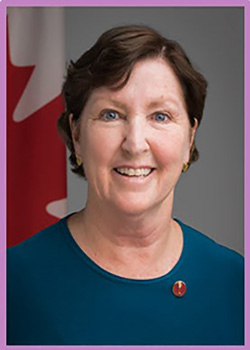
Biographical Information
Mary Coyle was appointed to the Senate in 2017 by Prime Minister Justin Trudeau (Retires November 4, 2029).
Senator Coyle holds a diploma in French Language from the Université de Besançon in France and a Bachelor of Arts in Languages and Literature from the University of Guelph. She also has a Master of Arts in Rural Planning and Development from the University of Guelph.
In 1997, Senator Coyle joined St. Francis Xavier University, serving as Vice President and Director of the school's Coady International Institute, a centre of excellence in community-based development and leadership education.
Since 2014, Senator Coyle has worked as the Executive Director of the Frank McKenna Centre for Leadership at St. Francis Xavier University. She also continues to work as an advisor and facilitator for various organizations, including the Haitian Centre for Leadership and Excellence and the Friends United Indigenous Arts and Culture Initiative.
Senator Coyle played a role in the establishment of the Stephen Lewis Foundation, the Romeo Dallaire Child Soldiers Initiative, and the Indian School of Microfinance for Women.
Nancy J. Hartling – Independent Senators Group (ISG) New Brunswick

Biographical Information
Nancy J. Hartling was appointed to the Senate in 2016 by Prime Minister Justin Trudeau (Retires November 10, 2034).
Senator Hartling completed two university degrees and founded the non-profit organization Support to Single Parents Inc. (SSPI) of which she was the Executive Director for thirty-four years. She has advocated locally, provincially and nationally on socio-economic issues facing single parents and their children, and has led innovative programs to address the challenges for low-income single mothers.
Senator Hartling was also a founding member of St. James Court Inc., an affordable housing complex for single parents. She has contributed to programs for the elderly and has been researching healthy aging and population needs. In her work she built and maintained partnerships with all levels of government, community agencies, universities and educational institutions, businesses and media. Her involvement on women's issues has been extensive, including co-chairing the provincial Minister's Working Group on Violence against Women, serving on the Board of the Muriel McQueen Fergusson Centre for Family Violence Research, co-chairing for New Brunswick for the Women's World March 2000, as well as lecturing at the University of New Brunswick.
Senator Hartling's record of achievement in community service, in organizational leadership and in advocacy has been recognized with several awards, such as the Governor General's Award in Commemoration of the Persons Case, the Community Spirit Award from the United Way of Greater Moncton and Southeastern New Brunswick, and the Order of New Brunswick.
David M. Arnot- Independent Senators Group (ISG) Saskatchewan
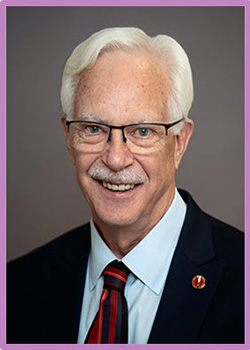
Biographical Information
David M. Arnot was appointed to the Senate in 2021 by Prime Minister Justin Trudeau (Retires April 16, 2027).
Senator Arnot holds a Juris Doctor from the College of Law at the University of Saskatchewan. His legal career serving the people of Saskatchewan started in 1976.
He worked as the federal Treaty Commissioner for the Province of Saskatchewan provincial court judge, a Crown prosecutor, and as Director General of Aboriginal Justice in the Department of Justice Canada.
In 1993, as a judge with the Provincial Court of Saskatchewan, Senator Arnot closely worked with the Poundmaker First Nation to pioneer the use of sentencing circles and restorative justice measures. In 2004, Senator Arnot's work on the "Teaching Treaties in the Classroom" project was recognized by the United Nations Special Rapporteur on Racism.
Senator Arnot is the recipient of the Queen Elizabeth II Golden Jubilee Medal, the Distinguished Service Award from the Canadian Bar Association's Saskatchewan Branch, the Miklos Kanitz Holocaust & Human Rights Award, and the University of Saskatchewan's Canada 150 Nation Builders alumnus award.
Kim Pate – Independent Senators Group (ISG) Ontario
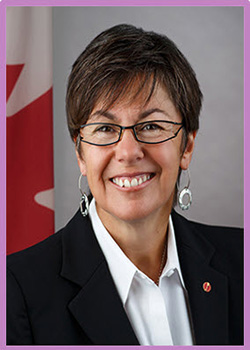
Biographical Information
Kim Pate was appointed to the Senate in 2016 by Prime Minister Justin Trudeau (Retires: November 10, 2034).
Senator Pate graduated from Dalhousie Law School in 1984 with honours in the Clinical Law Program and has completed post graduate work in the area of forensic mental health. Trained as a teacher and a lawyer, she has been at the forefront of public education campaigns, research, and legislative and administrative reform at the regional, national and international level.
From 1992 to 2016, she worked with and on behalf of women in prison and provided support toward their reintegration into society in her role as the Executive Director of the Canadian Association of Elizabeth Fry Societies (CAEFS). She was involved in the Inquiry into Certain Events at the Prison for Women in Kingston. She has also shed light on the special needs of Indigenous women and their overrepresentation in Canadian federal prisons, and those with mental health issues.
A part-time professor in the University of Ottawa's Faculty of Law, she has authored many articles in academic journals. She has also served on a host of boards, committees and advisory groups, and is currently on the advisory board of the National Women's Legal Mentoring Program, Human Rights International's Canadian Advocacy Committee, and Legal Aid Ontario's Prison Advisory Committee.
Dan Christmas, (Deputy Chair) – Independent Senators Group (ISG) Nova Scotia
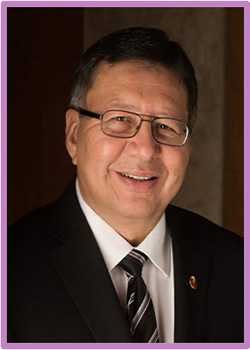
Biographical Information
Dan Christmas was appointed to the Senate in 2016 by Prime Minister Justin Trudeau (Retires: September 10, 2031).
Senator Christmas is from Membertou, a First Nation of less than 2,000 on Cape Breton Island. He is the first Mi'kmaw Senator to be appointed to the Senate of Canada.
Senator Christmas has been actively involved in the implementation of Mi'kmaw aboriginal and treaty rights in Nova Scotia. He served as the Band Manager for the Community of Membertou for five years. He also worked for the Union of Nova Scotia Indians for 15 years, and served as Director for the last 10 years. He was elected councilor in Membertou for 18 years as well as a senior advisor to the First Nation for almost two decades.
Senator Christmas has been active in a number of international, national, provincial and local agencies in a wide range of fields including aboriginal & treaty rights, justice, policing, education, health care, human rights, adult training, business development and the environment.
In 2005, Senator Christmas was awarded an honorary Doctor of Laws degree from Dalhousie University and an honorary diploma from the Nova Scotia Community College in 2016. In 2008, he was the recipient of the National Excellence in Aboriginal Leadership Award from the Aboriginal Financial Officers Association of Canada.
Senator Christmas is the Deputy Chair of APPA.
Michèle Audette – Independent Senators Group (ISG) Quebec (De Salaberry)
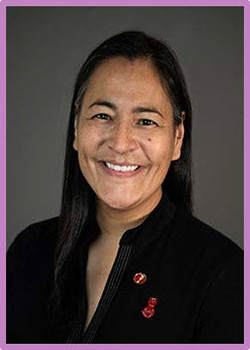
Biographical Information
Michèle Audette was appointed to the Senate in 2021 by Prime Minister Justin Trudeau. (Retires July 20, 2046).
Senator Audette is a recognized Indigenous leader from the Innu community of Uashat mak Mani-Utenam in Quebec. She was president of the Quebec Native Women's Association and then, in 2004, she was appointed Associate Deputy Minister to the Secrétariat à la condition féminine of Quebec. From 2012 to 2015, she served as President of the Native Women's Association of Canada. In 2015, she helped create an innovative graduate program in Indigenous public administration for the École nationale d'administration publique.
Senator Audette was appointed as one of the five commissioners responsible for conducting the National Inquiry into Missing and Murdered Indigenous Women and Girls. Since 2019, she has been Assistant to the Vice-Rector of Academic and Student Affairs, and Senior Advisor for reconciliation and Indigenous education at the Université Laval.
Senator Audette received the 2018 Woman of Distinction Award in the Inspiration category from the Women's Y Foundation of Montréal. She was named Woman of the Year in 2014 by the Montreal Council of Women, and was awarded the Queen Elizabeth II Diamond Jubilee Medal in 2012. She also received an honorary doctorate from the University de Montréal, for her commitment to the cause of Indigenous women and her work on reconciliation.
Donald Neil Plett – Conservative Party of Canada (C) Manitoba (Landmark)
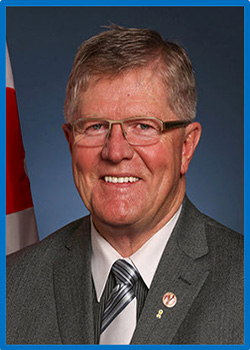
Biographical Information
Donald Neil Plett was appointed to the Senate in 2009 by Prime Minister Stephen Harper. (Retires May 14, 2025).
As a Red River College alumnus, Senator Plett served on the Board of Governors of the College. He served as President of the Chamber of Commerce, Chair of the Village Council, and Chair of the local Utilities Board. Throughout the years, he has maintained an active interest in politics, including serving as the President of the Conservative Party of Canada. He remains the longest serving president of a conservative party in Canadian history.
Senator Plett is interested in: the protection of children, supporting Canadian farmers, religious freedom, free speech, fair democratic processes, and issues facing the trades and construction industry.
From 2015 to 2019, he was Opposition Whip in the Senate and since November 2019 he has been Leader of the Opposition in the Senate.
Yonah Martin – Conservative Party of Canada (C) British Columbia (British Columbia)
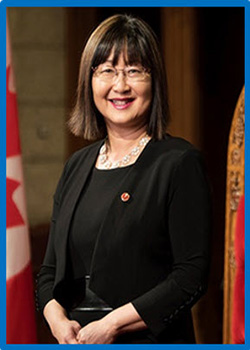
Biographical Information
Yonah Martin was appointed to the Senate in 2009 by Prime Minister Stephen Harper. (Retires April 11, 2040).
Senator Martin is the first Canadian of Korean descent to serve in the Senate, and the first Korean-Canadian parliamentarian in Canadian history. After immigrating to Canada in 1972, she attended the University of British Columbia. Senator Martin had a 21-year teaching career prior to being appointed to the Senate.
Senator Martin is involved in bridging communities, and co-founded C3 Korean Canadian Society, along with several regional, national and international Boards and Advisory Councils.
From 2013 to 2015, she was the Deputy Leader of the Government in the Senate, and was the Deputy Whip of the Government from 2011-2013. She is currently the Deputy Leader of the Opposition in the Senate (since 2015).
Dennis Glen Patterson - Canadian Senators Group (CSG) Nunavut
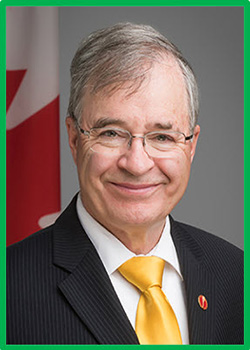
Biographical Information
Dennis Glen Patterson was appointed to the Senate in 2009 by Prime Minister Stephen Harper (Retires December 30, 2023).
Prior to his appointment, Senator Patterson (Nunavut) was Premier of the Northwest Territories.
As a member of the Legislative Assembly in the Northwest Territories, Senator Patterson served as Minister of Education, Minister of Health and Social Services and Minister of Justice, culminating in his service as Premier between 1987 and 1991.
He played a key role in the settlement of the Inuvialuit final agreement and the Nunavut final land claim agreement. Senator Patterson also served as a leader of the more than twenty-year campaign which led to the establishment of Nunavut as Canada's newest territory in 1999.
After serving as Premier, Senator Patterson established a private consulting firm, was admitted to the Law Society of Nunavut in 2001 and since 2003 has been a Trustee and, until September 2015, was the Chair of Governance, Compensation and Nomination Committee of the Northern Property Real Estate Investment Trust.
Senator Patterson is a former Chair of APPA during the 41st Parliament.
Scott Tannas – Canadian Senators Group (CSG) Alberta

Biographical Information
Scott Tannas was appointed to the Senate in 2013 by Prime Minister Stephen Harper (Retires: February 25, 2037).
Prior to his appointment, Senator Tannas was the founder, president and CEO of Western Financial Group.
Senator Tannas is currently the director of a number of private and public businesses, a member of the Ranchmen's Club of Calgary, and fundraiser for SOS Children's Villages Canada, and chairman of the Western Communities Foundation.
Senator Tannas is the Leader of the Canadian Senators Group and Senate Reform one of his key issues. He was a founding member of the Special Senate Committee on Senate Modernization, which delivered a series of reports advocating sweeping changes to the operations of the Senate.
Sandra M. Lovelace Nicholas – Progressive Senate Group (PSG) New Brunswick
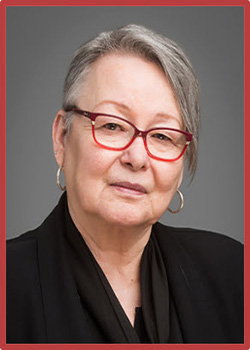
Biographical Information
Sandra M. Lovelace Nicholas was appointed to the Senate in 2005 by Prime Minister Paul Martin. (Retires April 15, 2023).
Senator Lovelace studied at St. Thomas University for three years and has a degree in residential construction from the Maine Northern Technical College. She is a Maliseet woman from the Tobique First Nation, NB. She has helped to secure rights for Aboriginal women in Canada, and is one of the Indigenous Famous Six. In the 1980s into the 1990s, she and five others challenged discriminatory provisions of the Indian Act, which deprived Aboriginal women of their status when they married non-Aboriginals. She was instrumental in bringing the case before the United Nations Human Rights Commission and lobbying for the 1985 legislation which reinstated the rights of First Nation women and their children in Canada.
In 1990, Senator Lovelace Nicholas was awarded the Order of Canada, and in 1992, she received the Governor General's Award in Commemoration of the Persons Case.
Brian Francis, (Chair) – Progressive Senate Group (PSG) Prince Edward Island
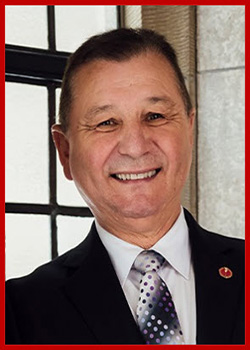
Biographical Information
Brian Francis was appointed to the Senate in 2018 by
Prime Minister Justin Trudeau. (Retires September 28, 2032).
He was the first Indigenous person in PEI to receive his inter-provincial red seal trade certificate. He went on to obtain a Certificate in Conflict Resolution Studies from the University of Prince Edward Island.
Senator Francis has 40 years of combined experience in government positions from the front lines to management. He served in various capacities with the public service including from 2002 to 2007 as the Aboriginal Coordinator with the Department of Fisheries and Oceans, where he acted as a point of contact for Prince Edward Island First Nations on fisheries related matters. Coming from a fishing family, he used his years of knowledge and firsthand experience to assist the Prince Edward Island First Nations with implementing their funding agreements. In addition, Senator Francis was one of the formal signatories to the Canada/Prince Edward Island/Mi'kmaq Partnership Agreement and the Canada/Prince Edward Island/Mi'kmaq Consultation Agreement, which set out a framework for consultation on proposed actions or decisions that could adversely impact asserted or established Aboriginal and treaty rights in the province.
From 2007-2018, Senator Francis was the elected Chief and Band Administrator of the Abegweit Mi'kmaq Nation. During his term, he worked to improve the social, economic and cultural well-being of his community.
Senator Francis is the Chair of APPA.
Patti LaBoucane-Benson – Non-affiliated Alberta
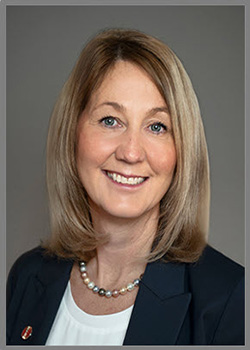
Biographical Information
Patti Laboucane-Benson was appointed to the Senate in 2018 by Prime Minister Justin Trudeau. (Retires: February 20, 2044).
Senator LaBoucane-Benson is Métis, and is currently working as Director of Research, Training, and Communication at the Native Counselling Services of Alberta.
She attended the University of Alberta where she received a Ph.D in Human Ecology, with a focus on Indigenous family resilience.
Senator LaBoucane is also a lecturer for the University of Alberta's Executive Education program, and with the Peter Lougheed Leadership College. She was the director and lead facilitator of the Canadian Nelson Mandela Dialogues 2017.
She has been the recipient of numerous awards and distinctions, including the Alberta Aboriginal Role Model Award for Education, the Legal Aid Access to Justice Award, the Rotary Paul Harris Fellow, and the Sam Laboucan Memorial Award.
Patrick Brazeau – Non-affiliated Quebec (Repentigny)
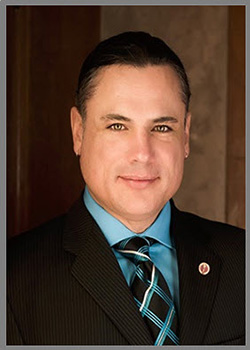
Biographical Information
Patrick Brazeau was appointed to the Senate in 2008 by Prime Minister Stephen Harper. (Retires: November 11, 2049).
Senator Brazeau is a member of the Algonquin community of Kitigan Zibi, and was the National Chief of the Congress of Aborginal Peoples (CAP) from February 2006-January 2009.
He served in the Canadian Armed Forces and holds a diploma in Social Sciences from Heritage College and has also studied Civil Law at the University of Ottawa.
Senator Brazeau is an advocate for mental health, and accountability, responsibility and transparency regarding Indigenous Affairs. He is vocal proponent for the replacement of the Indian Act with more progressive legislation that aims to reconstitute true historical First Nations, including jurisdiction over their own affairs. He supported the efforts to hold an inquiry into Missing and Murdered Indigenous Women and Girls.